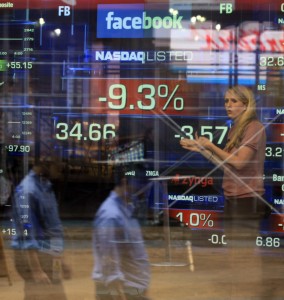Facebook hits new low as IPO lock-up ends

inside the Nasdaq MarketSite in New York’s Times Square. Facebook’s stock plunged to a new low Thursday, Aug. 16, 2012, after the expiration of a ban that had prevented some early investors and insiders from dumping millions of additional shares they own in the social-networking leader. AP PHOTO/RICHARD DREW
NEW YORK—Facebook’s stock plunged below $20 Thursday after the expiration of a ban that had prevented some early investors and insiders from dumping millions of additional shares they own in the social-networking leader.
Firms ranging from Accel Partners to Goldman Sachs, Zynga CEO Mark Pincus and Facebook board members James Breyer, Peter Thiel and Reid Hoffman were among those free to sell stock they own, after the lifting of a ban known as a lock-up period. If many of them took advantage of that, Facebook’s stock could decline because the market would be flooded with nearly two-thirds more shares.
It’s not yet known whether any of those investors had sold any shares. The stock price decline could have reflected investors’ anticipation of such a move.
Facebook Inc.’s stock traded as low as $19.69 before bouncing back to $20.14 in afternoon trading Thursday. That’s still down 5 percent, or $1.06, from Wednesday’s close and about 47 percent below its initial public offering price of $38.
If the stock hits $19, it will have lost half its value since Facebook went public in May.
By 1:30 p.m. EDT (1730 GMT), nearly 120 million shares had traded — nearly four times the average volume on a full day.
Venture capitalists who invested in Facebook as early as 2005 were likely eager to sell at the earliest opportunity. Though it’s trading at about half of its IPO price, Facebook’s stock is still very expensive, said Sam Hamadeh, the CEO of PrivCo, which researches privately held companies.
“With VCs, they know that waiting for a better price is a fool’s game,” he said.
It’s been a rough run for Facebook. After one of the most anticipated IPOs in history, Facebook suffered what may be the most-botched public offering as trading glitches marred its first day. It’s been almost all downhill for the Menlo Park., California, company since then.
Investors have been concerned about Facebook’s ability to keep increasing revenue and make money from its growing mobile audience, even as many analysts hold positive long-term views.
Those eligible to sell stock on Thursday were the investors and directors who had participated in the May IPO. The exception was CEO Mark Zuckerberg, who will be ineligible until November. Microsoft Corp., an early Facebook investor, was eligible to sell, though it was unlikely to do so because of partnerships it has with the social network.
Lock-up periods prevent insiders from unloading shares too close to an IPO and can help prevent volatility that might occur if too many shareholders decide to sell a newly traded stock all at once. They generally start to expire 90 days after a stock makes its public debut. Thursday marked 90 days since Facebook’s began trading publicly on May 18.
Other shareholders, including many Facebook employees, will be able to sell beginning in October. The last lockup period expires next May, a year after the IPO.
In all, up to 1.91 billion more shares could flood the stock market over the next several months — more than four times the 421 million shares that have been trading since Facebook’s IPO. Of the 1.91 billion, 271 million shares became eligible for sale Thursday.














